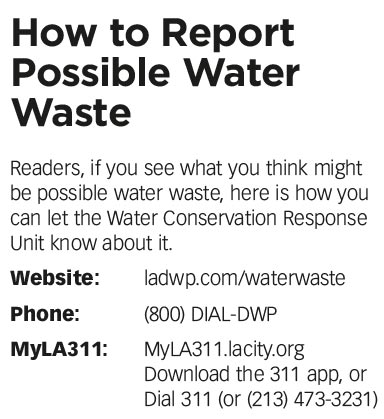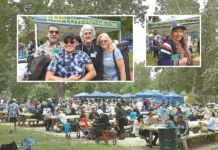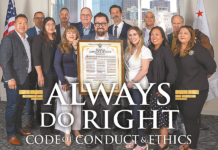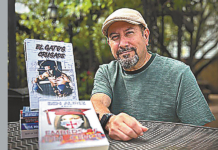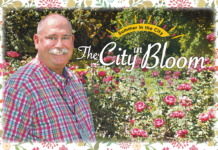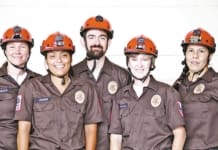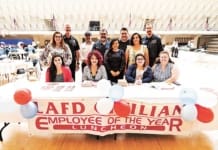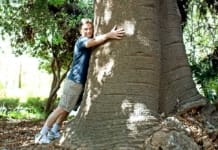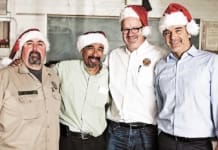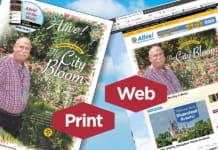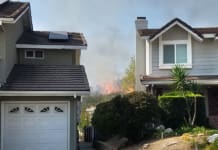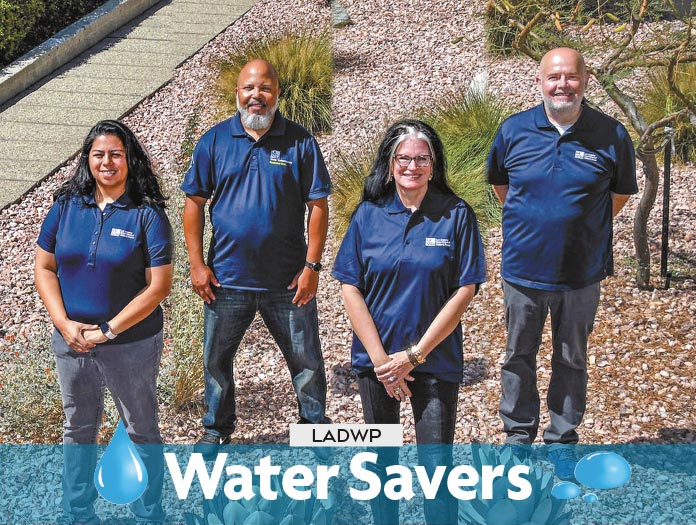
LADWP’s Water Conservation Response Unit addresses water waste Citywide through prevention and education.
Photos courtesy of Los Angeles Department of Water and Power (LADWP).
C
all them investigators. Researchers. Responders. Problem solvers. Or educators. They’re the Water Conservation Response Unit (WCRU), the LADWP team that’s dedicated to helping solve the City’s water crisis.
They’re the Water Savers.
Technically, the Water Conservation Response Unit, founded in 2014, enforces the City’s Water Conservation Ordinance, a law that sets efficient water use rules depending on available supplies. The ordinance was created, and then enhanced in stages, in response to the growing and dire drought that has gripped the Southwestern United States over the last few decades.
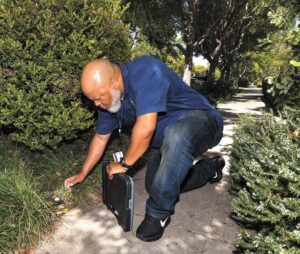
The recent downpours have quenched the state with rainfall, but the drought still remains. The ordinance is set up to prepare against the drought over many decades. LA’s challenge to provide enough water is not going away anytime soon, and the ordinance remains in place.
“We just want people to conserve the water,” says Kristi-Ann Lopez, Utility Services Specialist, 17 years of City service, Club Member. “If we can do that, we can make sure everyone has the water they need.”
The Water Crew splits its time in its office, following up with those estimated to be using too much water, and on the road in neighborhoods, using their eyes and ears to witness water waste.
The team isn’t out to punish citizens, Kristi-Ann says, unless that’s necessary. Their role is education, to help Angelenos fix their water issues and conserve water more effectively. She wants people to know the department has a great many solutions to the most common equipment failures or lack of knowledge of the law.
The Water Crew works hard to make sure we all have what we need in this time of drought. Their story is on these pages.
‘We just want people to conserve the water. If we can do that, we can make sure everyone has the water they need.’
— Kristi-Ann Lopez
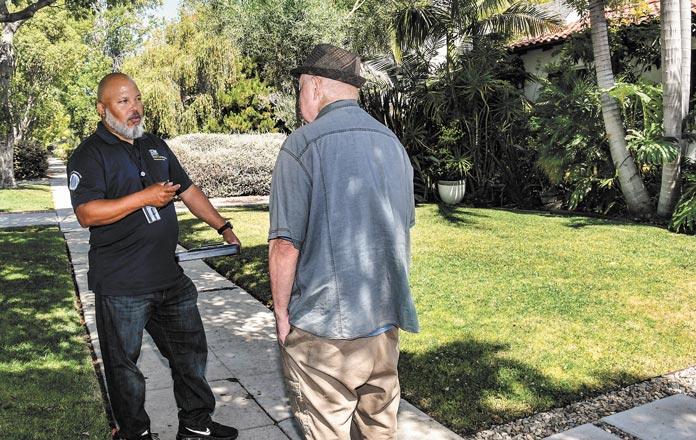
| THANK YOU!: The Club thanks Mia Rose-Wong, Club Member, for her assistance in producing this month’s feature on the Water Conservation Response Unit. It was an honor talking to the team that helps LA conserve its precious natural resources. |

 Educate and Save
Educate and Save
On Wednesday, Jan. 4, Club CEO Robert Larios and Alive! editor John Burnes interviewed Kristi-Ann Lopez, Utility Services Specialist, 17 years of City service, Club Member and Club Softball champion. She’s part of the LADWP’s Water Conservation Response Unit, which enforces the Emergency Water Conservation Ordinance, educates residential and commercial customers about the importance of water conservation and responds to water waste complaints received from the public. The interview took place via Zoom.
Hi Kristi-Ann, thanks for joining us!
Kristi-Ann Lopez: Good to be with you! I’m a proud Club Member!
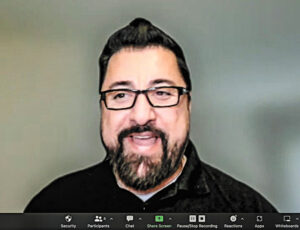
That’s great. We’re here to talk about your role with the LADWP’s Water Conservation Response Unit, the team that’s tasked with helping customers act within the City’s conservation ordinance.
Right.
You’re a member of the water conservation unit, but you’re not a supervisor of it.
Right. I have a supervisor and a manager over me.
Got it. How did you get to your current position?
I started with the City back in March 2006 as a Clerk Typist, and from there I moved to a Customer Service Representative with the Department of Water and Power in 2010. During that time I went to school and earned my bachelor’s degree in business and learned as much as I could about the Department of Water and Power, its different programs, the different services that we provide to our customers. That led me into the position I have now. When the position opened, I submitted my name and I was lucky enough to get picked for the Water Conservation Response Unit.
Were you part of the unit when it began?
No, I was not part of it when it was created. I joined the unit in 2018.
You are from a City family.
That is correct. I come from a family of City workers. My father, Vincent, worked for the City before moving to the LADWP in Workers Compensation. My Uncle Richard worked for the Bureau of Street Services in Public Works. My godfather, my Uncle James Warren, who’s like my second dad, worked as a civilian for the LAPD.
They are all Retired from the City.
And the City is a much better place for all the service that they gave us.
Yes. Half of them actually still live in the City. I was born and raised in the City and still live in the City, too.
Are you the last in your family to be still employed by the City?
Yes.
You’re holding the family fort, so to speak.
Yes. We’ll see what my daughter does. She’s still got another 10 years before she’s grown, so we’ll see what happens there.
We look forward to the decisions that she makes in the future. We hope that will happen.
Yes!
When you started working for the City, was it directly with the LADWP, or did you begin in another department?
I used to work for Building and Safety. When I first joined the City as a Clerk Typist, I worked at the Van Nuys One Stop Service Shop. I helped people with pulling history records on properties, issuing express permits, permits that didn’t require plans, helping contractors, things of that nature. For my whole City career I’ve been involved in helping people do what they need to do concerning City regulations. Everything I’ve done with the City has been helping people accomplish their goals.
 The Water CRU (“Crew”)
The Water CRU (“Crew”)
What is the Water Conservation Response Unit all about?
We’re there to inform the public of the City ordinance relating to water conservation – watering days, when we can water, watering before 9 a.m. or after 4 p.m., and so forth. We’re there to remind them to follow the ordinance and, if we have to, enforce it by sending letters and notifications to the water account holders.
But our main purpose is education and behavior change to follow the ordinance. That’s all we’re asking. Sometimes when we’re out there on patrol, we find customers watering on the wrong day, for instance. Or right now, in this [rainy] weather, we might find someone continuing to water even though it’s been raining because they don’t have the most updated irrigation controller that can synch in by using their Wi-Fi. When we talk to people, we suggest improvements. We don’t want to send them a letter to tell them they’re not doing something right; we’d rather they learn what the LADWP has to offer, to take advantage of it. Conservation goes a long way. Education is our main purpose.
How do you interact with the public? What’s the percentage of sending out letters or emails, and boots on the ground?
It’s more like 50-50 for the most part. When the drought worsening was announced, we were inundated with additional information about people not following the ordinance. We had to react to that. But a lot of the personal interaction I have comes when I’m out there patrolling, because when I find a property that’s not following the ordinance, I want to document it because I want the owner or account holder to know that we have evidence that this is what happened here, and we’d like you to fix it. We don’t want the property to be watered on the wrong day or watered on a day it’s raining. A lot of times when I step out of the vehicle and I go to document what’s happening at a property, I’ll be approached by someone in the neighborhood. And a lot of times a property owner will come out and approach me to ask me why I’m there. That is always the first question. I just inform them, “I work in Water Conservation. I’m driving around and I just wanted to let you know this is what I noticed about the property.” I hand them an information flyer regarding the ordinance, letting them know everything that we’d like them to follow. We have a conversation and let them know how they can correct it and what programs or rebates we might have to offer. For instance, if there’s a broken sprinkler, we have a sprinkler rebate. I also let them know about the newest technology in sprinklers, that can not only fix the leak, but we can help them save water by using a newer sprinkler that is more efficient.
It’s amazing when I’m out in the City vehicle, people will just stop me. “Hey, I have a question,” and they’ll ask me random things. That’s always funny to me. But, I’ve been told about issues they might see, that sort of thing. It’s really nice that, when I have those interactions, we both leave with smiles. A lot of times, when we’re out there telling people what they’re doing isn’t in line with the ordinance, it’s not usually a pleasant conversation. It’s important for me to make sure they know I’m out there to actually help, not penalize.
It sounds like your approach is more educational rather than being punitive.
Absolutely. There are certain situations where we’ve had to do a little bit more outreach than what our initial response was. Sometimes we’ll send the letter out, but we don’t see a change in behavior, so we’ll do a little bit more investigating into the case to see why. Maybe they didn’t get the letter, so we make a phone call to ask them to fix it.
It’s actually been pretty successful when we’ve done it that way. But unfortunately, we can’t call everybody in the City after we send a letter. There’s just not enough staffing to do that. We do our best, and we go by what we see. We just want correction; we just want people to conserve the water. If we can do that, we can make sure everyone has the water they need.
Right, well said. When you go out on patrol, is it general patrol or do you work on tips?
A combination of the two. We keep a record of which areas I’ve driven through and when. I don’t want to drive down the same block the same week.
We definitely make our rounds. And we definitely get tips from the public, which is great, because they do help us find some things that are occurring. This person wants help with a situation. Let’s see what we can do.
Right. How many are in the Water CRU (“Crew”)?
It varies. Some days we have personnel from other units who pitch in, on an as-needed basis. But there are about eight on our staff at the moment. We’ve grown.
Basically, our main purpose is education. We want to help people conserve water through education. And we do it every day out of the year, even in the rain. If we have to go out there and patrol in the rain, we will. We’ll do anything we can to help the City.
 History and the Ordinance
History and the Ordinance
Can you give us a brief history of how the unit came about, and why it came about?
The unit came about from the ordinance.
The water ordinance.
Yes, the Emergency Water Conservation Ordinance drove the creation of our group. Our job is to inform customers about the ordinance and enforce it. I’ve been with the Department since 2010 and it had a different program prior to that. They had something in place prior to our group.
And but then, with the creation of the ordinance, that’s when your specific group came into formation?
Correct.
Was the ordinance strengthened since its creation, kind of like a version two?
More like the ordinance has different phases embedded into it that come into effect at different stages. For the ordinance to advance to the next phase, the Mayor has to approve it along with the City Council. It goes through the steps that the Department recommends to elevate the phase level. The LADWP recommends an increase, depending on conditions. It goes through the Board of Water and Power Commissioners and all our steps. And then we pass it on to the Mayor and the City Council, and the City Council has the final vote, I believe, on increasing the severity, with the Mayor’s blessing.
Presently, we’ve elevated it to the third level, phase three.
People aren’t always aware there is a water ordinance. I say, do you remember when they stopped serving drinking water at restaurants unless you asked? That’s from the ordinance. It’s just that every time we’ve upped a phase, there are different things we have to do.
The Water CRU (“Crew”) isn’t setting policy, you’re just answering it. You’re just enforcing it, or educating people about what the law is.
Exactly.
In what sector do you find the most serious infractions, where the most education is needed? Is it residential? Business? Education? Non-profits?
In my experience, I deal mostly with residential – homes, multi-residential properties; those are generally the properties that we reach out to. But when I’m on patrol and I’m driving around, it doesn’t matter what kind of property it is. I’ve had gas stations with a little tiny patch of grass on the corner of the island where the sprinkler was going everywhere, and I’ve had to educate them as well. I look for wherever the water’s coming from; wherever I see the water, I look for the cause. But the majority of minor action has been with residential and multi-residential customers.
Are you basically business hours? Or are you 24/7?
We’re not 24/7, but we do work outside the standard business hours. We’re not a nine-to-five group, that’s for sure, because that’s not going to help our public as much. I love to go out on a Tuesday for patrol because that is a non-watering day throughout the City of Los Angeles. I can start early, before 8 a.m., driving around and connecting with walking groups. Those are always fun, because I get to talk to five people at a time instead of just one.
Do you ever make formal, or informal, presentations to groups about water conservation in the City of LA?
We have in the past when needed, and we’re more than happy to. But the department has a different group that goes out and makes presentations to the public. It would be a special case when we would be asked to do it. We definitely present our information to our fellow employees from time to time.
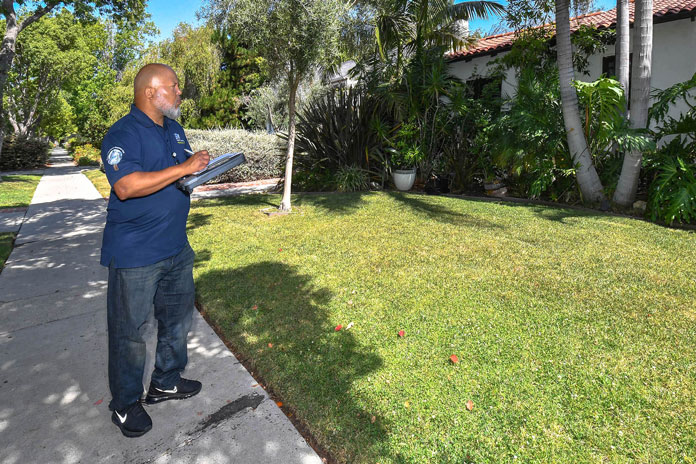
 Water Management
Water Management
What can people do better to manage their water use?
Be more aware of what’s happening in their homes. A lot of people nowadays tend to rely on technology to help them figure out what’s happening in this world. I wish we could apply that more to our homes. We all have our cellphones in our hands, and we have a certain level of acceptance of things. I really wish people who are homeowners in particular would get a flow sensor device. As a home owner myself, I know that having a leak in your property that you can’t see or don’t know about, it really hurts your bill and your financial situation. But we have a rebate program for that technology, and a simple device could help you avoid a massive leak, a massive bill and a massive waste of water. With the rain right now, I wish anyone who has sprinklers would get a weather-based irrigation controller because it can download the weather data from your Wi-Fi systems and it will know not to water for the next two days for you. The LADWP rebates that technology at almost 100 percent, I believe, depending on what model you pick. It’s almost like free help. You just have to do a little legwork.
It’s really funny when you have conversations with people. I can see a lot of water coming off their property, and it’s probably a sprinkler issue. And then they come talk about their bill with me, and they didn’t realize there was a leak or other problem. Their gardener hadn’t told them. I can educate them about a lot of help that the LADWP offers. We can even come out and do a free assessment of their situation; it’s called the Home Energy Improvement Program. We have a lot of instructional videos and rebate programs. All they have to do is take advantage of them.
You must be a very accessible representative when you’re out in the field.
Oh, yes. That’s the point. There’s no hiding. I’m in the department car and a vest!
 Stories From the Field
Stories From the Field
Tell us a story or two about your fieldwork and encountering customers.
One of the funniest things was when I advised a new coworker to drive with his windows down when he was out patrolling, if it’s safe. He asked why. I said so you can hear water. He looked at me funny. This happened to me once – I heard suspicious water coming from somewhere. “Where is the water? Who is watering right now?” It was driving me nuts. I parked the car, got out and walked down the street until I got closer to it. And I found it – there was a leak in a water meter box for a senior home. I took a look inside and saw all this water. So I called in our emergency crews and they had it fixed within the day.
How far away have you heard water? A block or two? What’s your record?
Within the block. That’s my limit. But at six in the morning, there wasn’t a lot of traffic.
Another time, I helped a senior one time who had five or six broken sprinklers. There was a lot of water flowing down the street. I helped him fix his issues, to help him save money and stay out of our reports!
I had no idea it’s possible to hear water. Now every time I walk down the street I’m going to listen for it.
It’s amazing what you pick up.
A delicate question: Have things ever gotten tense?
Not too tense, really. I had had a customer say, “I don’t want to speak with you.” And I said, “That’s fine. That’s not a problem.” Everyone has a different comfort level. Some people are going to be a little apprehensive if I approach them, and I get it. Even though I’m in a City vehicle and wearing my vest, they don’t know me. We always try to keep some distance. I’m going to respect their wishes. I’m still going to send them some correspondence in the mail, though, to get them that information that they need to be aware of. We can communicate in a different way if we have to. None of us has issues with that.
 Improvement
Improvement
Have you seen an improvement in how LADWP customers manage their water?
I’ve seen improvement in them following the ordinance. If I find people who are not in line with the ordinance, I’m going to check on them once we’ve sent them some type of correspondence or made the outreach, to make sure that they are now following the ordinance; if they aren’t, I’m going to let them know. “Hey, we’re still going to work with you here because we didn’t forget about you.”
We are seeing fewer follow-up issues – They’re not watering on the wrong days anymore; they’re not watering when they’re not supposed to; they’re fixing their broken sprinklers. We’re seeing improvement.
At various times over the last few years as the drought has really taken hold, the LADWP has said, “Okay, customers of the LADWP have reduced their water usage a certain percent.” When you hear those percentages, do you feel that was in part due to your work?
Absolutely. People don’t realize how much a simple toilet leak can cost them. Anything that we do to help a customer save water, we definitely feel like we’re part of that result.
We’re a small piece of it. I’m a small fish, but I do feel like we’re all a piece of that success. But really, it’s everyone pitching in and doing a great job.
One purpose.
Exactly. We’ve always tried to stay ahead of the game for success. With everyone’s participation, it’s a win-win.
 A Natural Teacher
A Natural Teacher
What do you love about what you do?
I love interacting with the people. I was a trainer at one point for Customer Service representatives at the LADWP. I’m a natural teacher inside. That part really comes out when I talk to people. I love educating people on what I know. I love sharing knowledge, to be honest with you. Even with my friends, whatever it is in life, I just love to share knowledge if I think it’s beneficial to someone. I’m a people person, so the job is a good match. I get to talk to people and give them a pleasant result. I get to give them information and try to make things better for them. A lot of times I get to walk away with a smile, and so does the customer, which is really great.
Kristi-Ann, thank you very much for your time. I know you’re busy with the weather, and we appreciate what you’re doing for the City of LA.
Thank you so much. I had a great time. n


